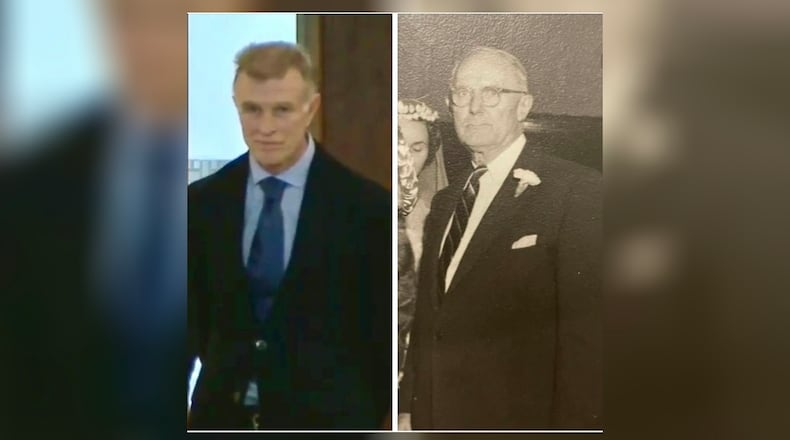The generational images were striking, like getting jabbed by Father Time.
After Mom died recently, we dug through old family photos. One was of my grandfather, William J. Torpy Sr., fedora in hand, staring at the camera with his familiar glower. It was from my parents’ wedding in 1957. He was 65.
I put Gramps’ photo alongside a shot of me, William J. Torpy III, getting ready to deliver mom’s eulogy. I turn 65 this year. We are the same age.
Grandpa Torpy of 1957 looked the same as I remember him 10 and 20 years later. Gray hair, stiff back, jowly and gruff. And while I’m no youngster, I look a decade or two his junior, with darker hair, a flattop and a skinnier face.
To be sure, Gramps was a tough guy from another era. He smoked a pack of unfiltered cigarettes a day, ran into burning buildings (without a mask) as a Chicago fireman and fought in World War I.
Granted, few people want to get old and fewer will admit it. But the question kept looming. Are people looking younger?
That question is all over the Internet. If you search those terms, you’ll find photos of a youthful Paul Rudd, the actor who starred in “Ant-Man,” posted alongside of Wilford Brimley, the walrus-mustachioed actor, as he appeared in the 1985 sci-fi movie “Cocoon.” That was the flick about oldsters who discover the swimming pool of youth.
Amazingly, both actors were around 50 when the photos were taken, although Rudd looks like he could be 39 and Brimley appears to be 70. In fact, Brimley’s looks served him well, giving him the grandfatherly gravitas to pitch oatmeal in TV ads while in his in his early 50s. To be fair, Brimley worked outdoors as a cowboy before acting and Rudd probably has a well-paid facial moisturizer crew.
This phenomena of folks seemingly remaining younger longer really is a thing, from physiological, social and even psychological standpoints. Part of it is due to better diet, health efforts and environmental factors. But people in recent decades have increasingly clung to their youth and youthful ideals. Decades ago, people carried themselves with a certain sense of maturity which has vanished through the years.
Credit: Facebook photos
Credit: Facebook photos
Recently, I saw a photo taken from the stands of the 1954 World Series between the New York Giants and Cleveland Indians. The crowd was made up almost entirely of men dressed in suits and ties. And hats. Back then, if a fan tried to enter the stands wearing sweat pants and a team jersey — as fans are want to do these days — they’d have a hard time clicking through the turnstile. It’s the casualization of America. Or perhaps its juvenilization.
I don’t think I ever saw my dad wearing a pair of short pants, and certainly not blue jeans with a Benny Goodman T-shirt. In short, people looked older way back when.
Turns out, there’s something to this. One oft-stated study, conducted in Finland and published in the The Journals of Gerontology in 2021, found that people in their late 70s who were born between 1939 and 1943 walked faster, had stronger hand grips, better knee extensions, verbal fluency and memories than 70-somethings born between 1910 and 1914.
This is due to many reasons: Better nutrition, improved healthcare, less smoking, less back-breaking labor and better education.
They say you’re as old as you feel and people increasingly are affording themselves the luxury of feeling younger.
So, when does old age begin? A study published by the Pew Research Center in 2009 answered that question by saying, “It depends.”
“Survey respondents ages 18 to 29 believe the average person becomes old at age 60,” Pew found. “Middle-aged respondents put the threshold closer to 70, and respondents ages 65 and above say that the average person does not become old until turning 74.”
Remember, it’s other people who get old.
I called Lisa Renzi-Hammond, who heads the University of Georgia’s Institute of Gerontology, which researches and teaches about all things aging.
“I think it is a real phenomena,” Renzi-Hammond said of people staying younger, longer. “It’s kind of everywhere. My grandparents looked older far before they were.”
Part of the reasons, said the youthful 41-year-old, are the environmental factors mentioned above, especially less smoking and better diet. “Our behavior has changed over the past century and it shows,” she said.
Credit: University of Georgia Marketing
Credit: University of Georgia Marketing
But another reason, Renzi-Hammond said, is “social comparison,” meaning people increasingly have all sorts of media images transmitted to them in the course of a day, carrying representations and aspirations of what they could or should look like.
“This inspires you to take up behaviors that literally make you appear younger,” she said.
Getting up there, having a foothold in Geezerdom, has always been seen as a detriment in a youth-crazy nation.
Increasingly, people don’t have to be distressed about aging and are embracing it. She said 40 is the new 30, and 60 is the new 50 and so on.
I don’t know what Gramps thought about all this. I don’t think he ever contemplated joining a 55-and-over pickleball league or gazed at a plate of locally sourced kale. But he lived to age 88.
About the Author
Keep Reading
The Latest
Featured





